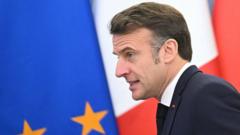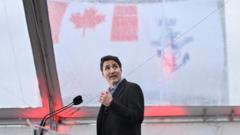As the French political landscape faces significant challenges, President Emmanuel Macron's hurried return from a trip to Poland signals a critical moment for his administration. With just days following a no-confidence vote that led to the dismissal of prime minister Michel Barnier, Macron is anticipated to unveil a new leader in hopes of re-establishing stability at the head of the government. An alarming poll indicates that 61% of French voters are concerned about the current political situation, highlighting a pressing need for resolution.
**Macron Sets to Appoint New Prime Minister Amid Political Uncertainty**

**Macron Sets to Appoint New Prime Minister Amid Political Uncertainty**
In a strategic move to navigate France's political turmoil, President Emmanuel Macron is poised to announce a new prime minister following the ousting of Michel Barnier.
In light of the new appointment, Macron has engaged in discussions with major political parties, omitting the far-left and far-right factions, aiming to build a collaborative government. His commitment to completing his second presidential term until 2027 comes with a resolve to prevent any repeat of the political collapse that befell Barnier’s administration, particularly after his controversial budget plans faced substantial opposition.
Rumors surrounding potential replacements for Barnier include prominent figures from the centrist and center-left domains, such as François Bayrou and Bernard Cazeneuve. However, coalition negotiations have been fraught with tension, particularly as left-wing parties demand representation and express reluctance to support central candidates. The fractious nature of political opinions underscores the complexities facing Macron as he strives for legislative consensus while navigating a divided assembly.
Macron's leadership style and political maneuvering will be crucial in overcoming the hurdles presented by a fragmented National Assembly. As the country reels from recent political shake-ups, the president’s next steps could not only define his administration but also shape the landscape of French politics in the coming years, especially in relation to parliamentary dynamics and public sentiment on key governance issues.
Rumors surrounding potential replacements for Barnier include prominent figures from the centrist and center-left domains, such as François Bayrou and Bernard Cazeneuve. However, coalition negotiations have been fraught with tension, particularly as left-wing parties demand representation and express reluctance to support central candidates. The fractious nature of political opinions underscores the complexities facing Macron as he strives for legislative consensus while navigating a divided assembly.
Macron's leadership style and political maneuvering will be crucial in overcoming the hurdles presented by a fragmented National Assembly. As the country reels from recent political shake-ups, the president’s next steps could not only define his administration but also shape the landscape of French politics in the coming years, especially in relation to parliamentary dynamics and public sentiment on key governance issues.



















